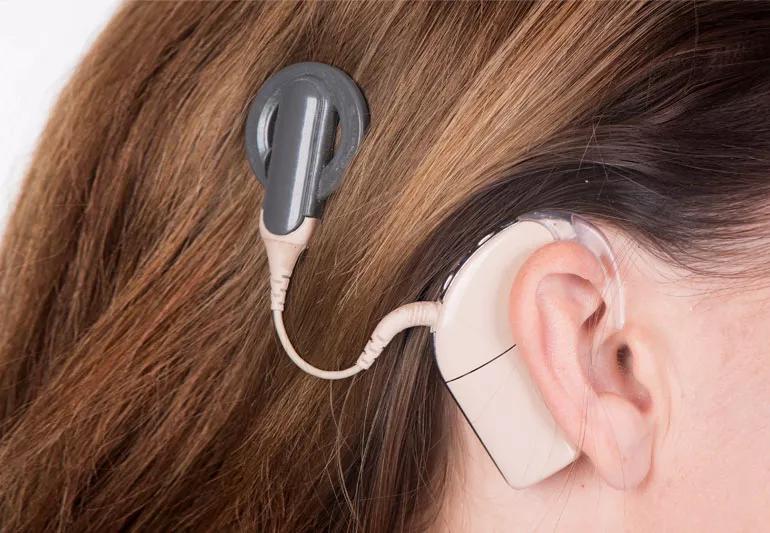They’re an option for many people with hearing loss

Image content: This image is available to view online.
View image online (https://assets.clevelandclinic.org/transform/5772bfea-f571-4ca8-b9fb-11f2955689f7/cochlearImplant-464470338-770x553_jpg)
Woman with cochlear implant
Cochlear implants can return the gift of hearing to a person with significant hearing loss. It can feel like a miracle. But many people don’t even consider this option, because they think these electronic implants are only for those with profound deafness.
Advertisement
Cleveland Clinic is a non-profit academic medical center. Advertising on our site helps support our mission. We do not endorse non-Cleveland Clinic products or services. Policy
In reality, many people could benefit from cochlear implants, including those with age-related hearing loss who are getting limited benefit from hearing aids. Could they work for you? Audiologist Sarah Sydlowski, AuD, PhD, has some answers.
The facts: They actually work quite differently.
“Hearing aids make incoming sounds louder. They rely on sensory cells in the inner ear responding to sound, and then they pass the sound through the auditory nerve to the brain,” Dr. Sydlowski explains.
But many types of hearing loss occur when those sensory cells stop functioning. If too many cells have stopped working, hearing aids might make things louder, but they won’t make sounds clear enough. You might still have trouble understanding speech or talking on the phone.
Cochlear implants bypass the sensory cells altogether. “Cochlear implants take the place of the sensory cells and directly stimulate the hearing nerve,” Dr. Sydlowski says. “They can improve clarity, even when hearing aids provide limited benefit.”
The facts: Age is not a limiting factor, and cochlear implants can be an option across your lifespan, Dr. Sydlowski says. People in their 90s and 100s have received cochlear implants.
Advertisement
The more important factor, she says, is how long you’ve had severe to profound hearing loss, and how consistently you’ve worn hearing aids. “It’s better to consider a cochlear implant sooner than later, so the amount of time that the hearing nerve has gone without good stimulation is shortened,” she explains.
It is also important that you are healthy enough to undergo the implant procedure, which is typically a two to three hour outpatient surgery.
The facts: “That was true 30 years ago, but the technology and the criteria for who is a good candidate have evolved tremendously since then,” Dr. Sydlowski points out. Today, cochlear implants are an option for people with moderate to profound hearing loss caused by decreased function of the sensory cells of the inner ear. That includes hearing loss due to aging, heredity, loud noises and certain illnesses.
There is also a special type of cochlear implant called a hybrid or short array that’s designed for people with very good low-pitch hearing but limited high-pitch hearing.
If you’re a candidate, it’s better to get cochlear implants before your hearing worsens. It takes time to train your brain to respond to them, and the longer you’ve had hearing loss, the harder it is for your brain to adapt, Dr. Sydlowski says.
The facts: People who wear hearing aids are used to paying out of pocket for those devices. But insurance plans — including Medicare and Medicaid — usually include cochlear implants as a covered benefit, Dr. Sydlowski says.
The facts: In a perfect world, your physician or hearing aid provider would let you know if you’re a candidate for cochlear implants. But unfortunately, many healthcare providers aren’t aware of how these devices have evolved — or how patients could benefit from them. “Only about 5% of the people who are candidates for cochlear implants have one,” Dr. Sydlowski says.
If you find your hearing aids just aren’t cutting it, it might be time to consider an implant. For an evaluation, contact an audiologist who specializes in cochlear implants. “One of the things I hear most from patients is, ‘I wish I wouldn’t have waited so long,’” she says. “This technology can be life-changing.”
Advertisement

Delivered every Tuesday!
Sign up for our Health Essentials emails for expert guidance on nutrition, fitness, sleep, skin care and more
It's a letter about the news!

Every two weeks once
Sign up for our Health Essentials emails for expert guidance on nutrition, fitness, sleep, skin care and more.
Learn more about our editorial process.
Advertisement
Most recommended precautions center around minimizing bruising or swelling
Even one drink can have an impact on your cognitive function leading to slurred speech, blurred vision and impaired memory
Understand who may (and may not) benefit
Lorem ipsum dolor sit amet. Et odio Quis vel ipsam omnis eum alias deleniti et placeat impedit non voluptas galisum hic autem enim et cupiditate aliquid. Est beatae quidem non facilis autem ut commodi nisi aut tempore rerum et dolores voluptatem cum enim optio id sapiente quasi. Ad laboriosam officiis 33 cupiditate sequi ea voluptatum consectetur qui necessitatibus voluptate et quasi doloremque et facere explicabo quo explicabo officia
Seeking help through therapy can be an important step in improving your quality of life when you have UC
Type 2 diabetes isn’t inevitable with these dietary changes
Applying a hot or cold compress can help with pain
Pump up your iron intake with foods like tuna, tofu and turkey